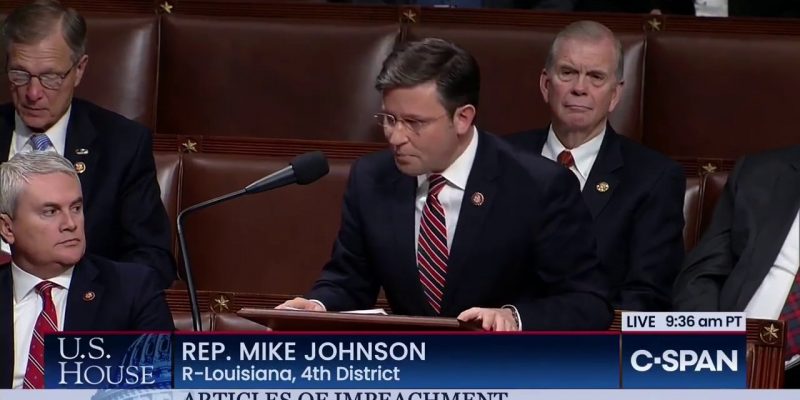Louisiana will have another bite at the apple when Republican Rep. Mike Johnson receives consideration for the U.S. House of Representative speakership this week.
Upon the deposing of former Speaker Republican Rep. Kevin McCarthy earlier this month, the House GOP first gave consideration to GOP Rep. Steve Scalise. But several holdouts within the Republican Conference made it clear to him that he could not gain the narrow margin necessary to win, and he withdrew his name with plans to remain as Majority Leader – currently with Hale Boggs the only Louisianans to serve in that role since it became institutionalized at the start of the 20th century.
With Scalise ruling himself out, the Conference then tried to settle on GOP Rep. Jim Jordan, Judiciary Committee chairman. Another small but different coterie of Republicans objected to his candidacy – Scalise rejected for not being conservative enough in being part of a leadership team having to compromise from time to time (American Conservative Union rating of 84 in the 117th Congress, 91 lifetime, where 100 means voting for the conservative preference every time), Jordan losing out because some thought him too conservative (ACU rating of 100 last Congress and lifetime). At that, the Conference decided to throw the process open to multiple candidates simultaneously, which later this week may resolve the issue.
Johnson, currently considered the fourth-ranked member of the party by virtue of being vice chairman of the Conference, announced with several others that they will vie to replace McCarthy. Only one has a more prestigious post than he, the now-second-ranked Majority Whip Rep. Tom Emmer of Minnesota who entered Congress a decade ago a term before Johnson. However, Emmer (lifetime 80, last Congress 73) actually has voted less conservatively than McCarthy or Scalise, so the discontent of even a few who enthusiastically backed Jordan for his ideological purity might sink his candidacy.
By contrast, Johnson might be able to thread the needle. He’s seen as conservative enough (92 lifetime, 91 last Congress) and as personable to bring disparate wings of the party together. But two questions cloud his chances.
Advertisement
First, the same handful of GOP members distrustful of the leadership under McCarthy may hold that against him. That fuels the bid of GOP Oklahoma Rep. Kevin Hern (lifetime 98, last Congress 100), who is chairman of the party-affiliated Republican Study Committee, a collection of the majority consistent conservatives in the party, who argues his recent entrance into the chamber (third term) and not having held a leadership position leaves him out of simmering personality conflicts and thus could unite best the party.
The other is the role of an inconvenient geographical fact; selecting Johnson would give Louisiana the top two positions in the party and chamber, which never has happened before, magnified by the relative small size of the Louisiana delegation. Members may balk at that arrangement funneling vast power to the delegation.
The winner likely would come from these three, with others probably too junior or too far outside the party power elite, although a potential dark horse candidate could be Texas’ Republican Rep. Pete Sessions, who in a long career has held important party posts but who a few years ago stepped back from leadership. Johnson may make history as Louisiana’s first Speaker, capping a remarkable rise in under a decade from crack constitutional lawyer outside of government to achieving one of the highest elected ranks in American government.
Advertisement
Advertisement

